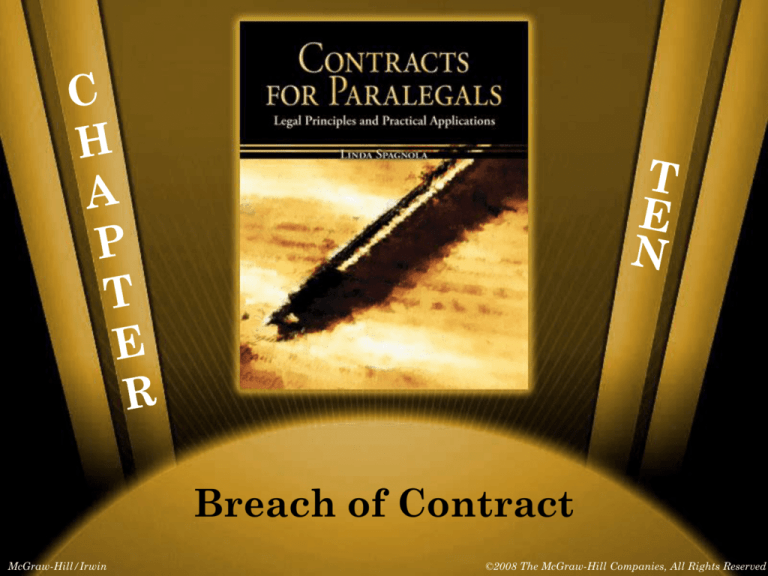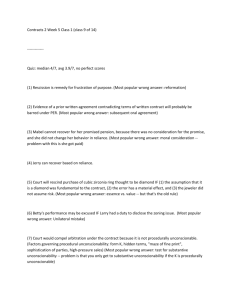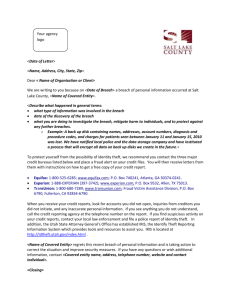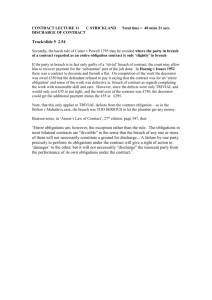
Breach of Contract
McGraw-Hill/Irwin
©2008 The McGraw-Hill Companies, All Rights Reserved
Objectives
Chapter Objectives:
• Use vocabulary regarding breach of contract
properly
• Discuss the theory of “anticipatory repudiation”
giving the party a right to sue prior to the
breach
• Determine if the breach is material and total or
nonmaterial and/or partial
• Explain recourses available to the nonbreaching party
10-2
Objectives
Chapter Objectives:
• Identify the factors a court will consider in
determining materiality
• Recognize the divisibility of a contract to
determine the extent of the breach and extent
of recourse available to the non-breaching
party
• Determine whether there has been a knowing
and intentional waiver after a breach has
occurred
10-3
Objectives
• This chapter will examine HOW courts
determine IF and WHEN a material breach of
a contract has occurred and HOW that breach
affects the viability of the entire contract
• After one or both parties have tendered
performance on the contract, one or both of
them may find that they received less than
they originally bargained for. The question
then arises, “what should be done about it?”
10-4
Definitions
• Breach
− Contract law examines the given
performance in light of the expectations of
the parties
− Where there is a significant deviation from
the expectation of the “innocent” party, the
party at fault is in breach
10-5
Anticipatory Repudiation
• Anticipation
– An expectation of things to come that
has reasonable basis for the conclusion
– The aggrieved party anticipates that
the performance is not forthcoming. By
permitting the aggrieved party to sue
before performance is actually due, the
potential damages can be mitigated
10-6
Anticipatory Repudiation
• What are the “certain circumstances” that
allow a party to seek relief for anticipatory
repudiation?
1. If a party has positively and unequivocally
stated that she will not or cannot perform
on the contract, that party has repudiated
the contract
10-7
Anticipatory Repudiation
• What are the “certain circumstances” that
allow a party to seek relief for anticipatory
repudiation?
2. A party’s actions, not words, may repudiate
a contract. If a party transfers interest in
the subject matter or an essential element
of the transaction making subsequent
performance or transfer impossible, the
party has repudiated the contract
10-8
Anticipatory Repudiation
• What are the “certain circumstances” that
allow a party to seek relief for anticipatory
repudiation?
3. any affirmative acts taken by a party that
would make performance of obligations
under the contract impossible constitute
anticipatory repudiation
− The action taken by the repudiating
party does not necessarily have to
directly relate to the subject matter of the
contract; the action may affect another
material aspect of the agreement
10-9
Anticipatory Repudiation
In all three of the scenarios described
above, the non-breaching parties have the
right to file a complaint for anticipatory
breach of contract. The non-breaching
parties have certain knowledge that the
other parties will not perform
10-10
Anticipatory Repudiation
• There are three actions that the aggrieved
party can take in response to the repudiation
1. The aggrieved party has an immediate
right to commence a lawsuit, despite the
fact that performance is not yet due
10-11
Anticipatory Repudiation
• There are three actions that the aggrieved
party can take in response to the repudiation
2. The aggrieved party can simply cancel the
contract and walk away
− If the non-breaching party feels there is
no point in pursuing performance or the
remedies for nonperformance, they can
just pretend the contract never existed in
the first place
10-12
Anticipatory Repudiation
• There are three actions that the aggrieved
party can take in response to the repudiation
3. “Wait and see” option
− The aggrieved party may choose to ignore the
repudiation and urge the potentially breaching
party to reconsider and perform
− If the repudiating party does not perform in the
contractually allotted time, the aggrieved party
may then sue for breach of contract based on the
nonperformance, not the anticipatory
repudiation
10-13
Anticipatory Repudiation
• Mere Request For A Change
– A party’s interest in renegotiating the
terms of the contract does not amount to
anticipatory repudiation
• Retract The Repudiation
– Until the aggrieved party notifies the
repudiator or takes some action in reliance
on the repudiation, the repudiator has the
right to “take it back” and perform on the
contract
10-14
Materiality
• Material
– An element or term that is significant or
important and relates to the basis for the
agreement a material breach is an
inexcusable failure by the breaching party
to do what was required of him under the
terms of the contract
– In reality, it makes the whole purpose of the
contract null as the aggrieved party will not
get what she bargained for
10-15
Materiality
• Restatement (Second) of Contracts § 241 best
explains the factors in determining whether a
failure of performance is material. They are:
1. the extent to which the injured party will
be deprived of the benefit which he
reasonably expected
10-16
Materiality
• Restatement (Second) of Contracts § 241 best
explains the factors in determining whether a
failure of performance is material. They are:
2. the extent to which the injured party can
be adequately compensated for the part of
that benefit of which he will be deprived
10-17
Materiality
• Restatement (Second) of Contracts § 241 best
explains the factors in determining whether a
failure of performance is material. They are:
3. the extent to which the party failing to
perform or to offer to perform will suffer
forfeiture
10-18
Materiality
• Restatement (Second) of Contracts § 241 best
explains the factors in determining whether a
failure of performance is material. They are:
4. the likelihood that the party failing to
perform or to offer to perform will cure
his failure, taking account of all the
circumstances including any reasonable
assurances
10-19
Materiality
• Restatement (Second) of Contracts § 241 best
explains the factors in determining whether a
failure of performance is material. They are:
5. The extent to which the behavior of the
party failing to perform or to offer to
perform comports with standards of
good faith and fair dealing
10-20
Materiality
• Deprived of expected benefit
− A party can reasonably expect to receive
that for which he bargained; if he does not
receive it, the breach is considered material
• Adequate compensation
− A party denied the benefit of his bargain
may be paid or otherwise put in a position
equivalent to where he would have been
had performance been in compliance with
the contractual terms
10-21
Materiality
• Forfeiture
− An unreasonable loss
10-22
Materiality
• The doctrine of substantial compliance covers
instances where the performance was not
perfect; however, when examined objectively,
using the above factors, it appears that the
party endeavored to perform to the best of his
or her ability and the performance was very
close to compliance
• The court will most likely then hold that there
was no breach because the party substantially
complied with the terms of the contract
10-23
Materiality
• After a material breach has occurred, the nonbreaching party is excused from performance
• A material breach is considered a total breach,
even though not every term of the contract
may have been breached
• Totality refers to the impact it has on the
entire contract. A total or material breach
renders the rest of the contract inert
10-24
Divisibility
Divisibility/Severability
A contract may be able to be
compartmentalized
into separate parts and seen
as a series of independent transactions
between the parties
10-25
Divisibility
• A contract often covers a series of transactions
between the parties. If these transactions can
be separated from each other, the contract is
considered to be divisible
• In this way, the breach is only partial and
contained to that part of the contract; the rest
of the contract can go on as if nothing
happened
10-26
Waiver
• Waiver
– A party may knowingly and intentionally
forgive the other party’s breach and
continue her performance obligations
under the contract
10-27
Waiver
• Knowing And Intentional
– a party must be aware of and plan on the
outcome of his words or actions in order to
be held accountable for the result
10-28
Summary
•
Nonconforming performance of contractual
obligations is a breach
•
These breaches can be either material and
total or minor and partial
•
After the time for performance is due, a
party may evaluate the tendered
performance and, if it is not what she
bargained for, the breach may be
considered material
10-29
Summary
•
To determine the extent of the breach, there
are five factors to consider:
– Deprivation of the benefit expected
– Adequacy of compensation
– Forfeiture
– Ability or likelihood of cure
– Good faith and fair dealing
10-30








